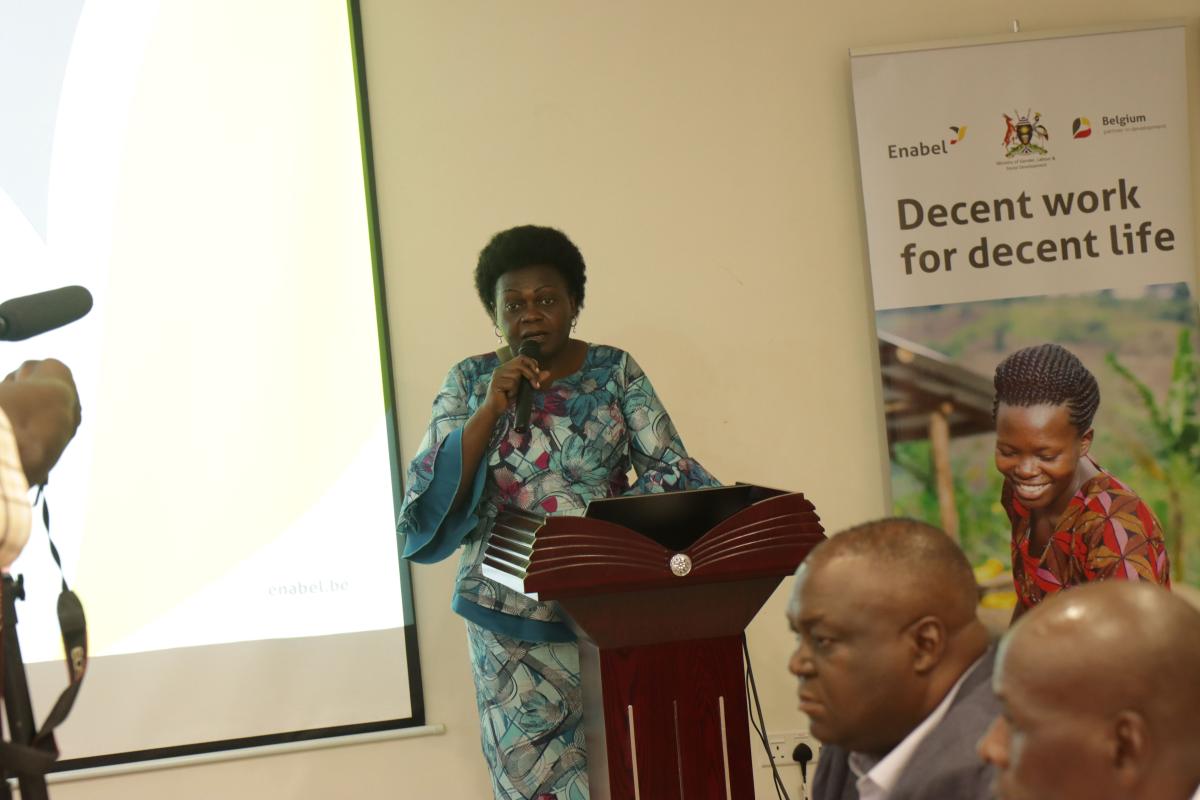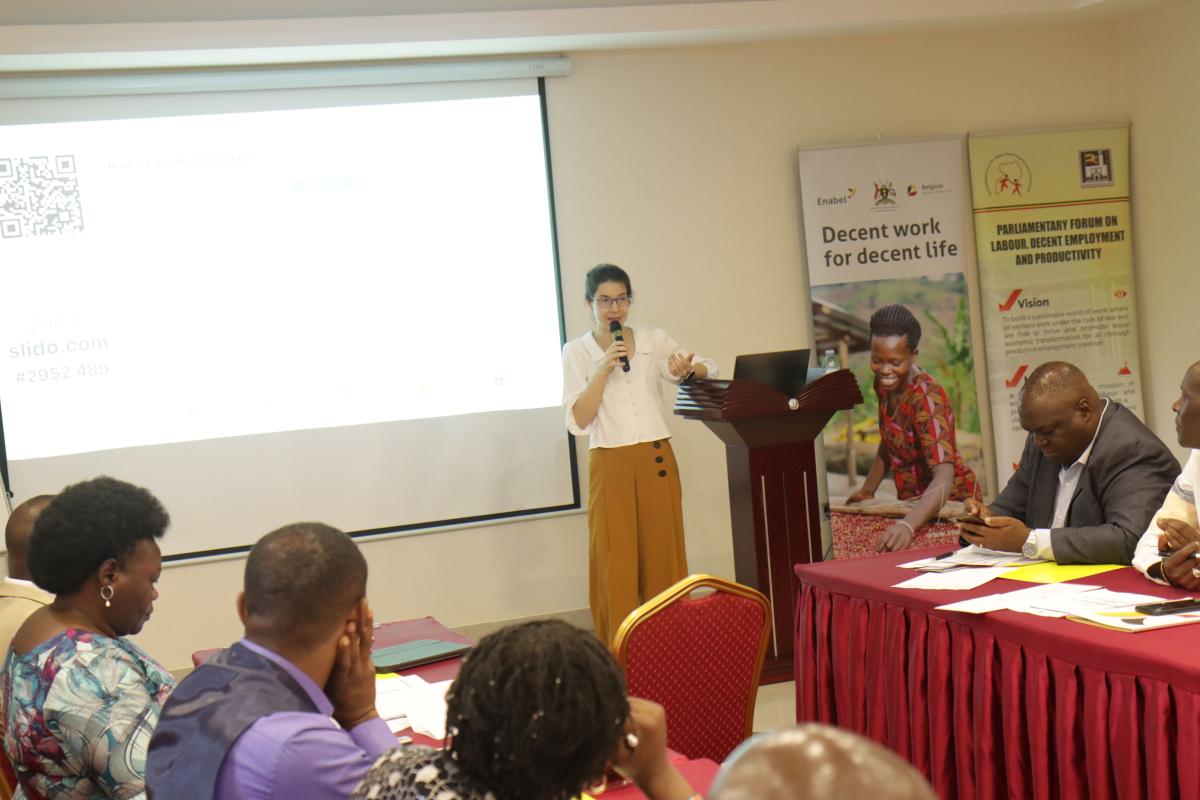Ugandan legislators to promote Labour rights and productivity
In a bid to
improve decent work and social protection for workers in Uganda, the capacity
of legislators and labour stakeholders was built on labour laws and
productivity through a training organized by the Ministry of Gender, Labour,
and Social Development in partnership with Enabel, and the Parliamentary Forum
on Labour Decent Employment and Productivity. Through the training, legislators
can ably advocate for and promote the role of decent employment opportunities
and productive labour in achieving sustainable wealth creation through
effective stakeholder engagement, legislation, and oversight. The two days’
training brought together 75 participants, who included Members of parliament, members
of labour unions, and employer organizations.
In his opening
remarks, the Chairperson of the Parliamentary Forum on Labour, Decent
Employment and Productivity, Hon. Roland Ndyomugyenyi said that they want to
build the capacity of the MP on the accreditation of the international labour
standards and the national laws regarding labour. “We want to create a
networking platform for all the members of parliament, labour unions, and
employers because labour is a multifaceted concept that involves several
stakeholders, and when we come together, we will be able to address the issues
and achieve high productivity”, said Hon. Roland.
The
International Labour Organisation (ILO) Chief Technical Advisor and Head of
Office in Uganda, Mr. Stephen George Opio in his communication said that skills
development is one of the issues that needs to be addressed because
productivity can not be achieved without investing in skills development. He
said that the forum should put into practice the 4 key principles of the ILO,
which are; the elimination of all forms of forced or compulsory labour, the
effective abolition of child labour, the elimination of discrimination in
respect of employment and occupation, and a healthy working environment for all
workers. “The parliamentary forum should strengthen their engagement with the
labour unions, Federation of Uganda Employers, and the government through legislation
and appropriation”, added Stephen.
Representing the
Ministry of Gender, Labour and Social Development (MoGLSD), Hon. Sarah Opendi,
in her opening remarks said that decent work can only be attained when the
necessary legislation is in place. There is therefore a need to undertake a
legal review, identify gaps, and make amendments. She said that the ministry is
currently spearheading the NSSF reforms, implementation of the Social
Protection and Decent Work agenda in partnership with Enabel, and the
operationalization of the Industrial Court. She said that the workers’ Members
of Parliament are currently working on the private members' bill regarding the
issue of the minimum wage. “Therefore, the Parliamentary Forum on Labour,
Decent Employment, and Productivity should work hard to ensure that the bill is
on the order paper and is enacted”, added Hon. Sarah Opendi.
The
Parliamentary Forum on Labour, Decent Employment, and Productivity was
incorporated and registered on 11th October 2021. It adopted its ambition in
accordance with Vision 2030, NDP Plan III, Labour Policies and Laws, the
International Labour Organisation Strategic Plan, and Ministerial Policies on
Labour and Productivity to; enhance labour productivity and decent work
promotion, promote Safe Working Spaces, promote Innovation and Technology
through skilling for socio-economic transformation, create models for
employment and on job retentions, promote Apprentice and work-based learning,
and promote green jobs for safe working environment.
The training is
a decisive step towards ensuring that the rights and welfare of Ugandan workers
are secured, that labour laws are aligned with international standards, and
that the nation progresses towards a future of equitable development and social
justice which will be achieved through advocacy and informed debates on the
floor of Parliament.
The Ag. Country Portfolio
Manager for Enabel in Uganda, Mr. Ali Azoti in his opening remarks said that
critical components of pillar 5 of the Social Protection Project have been
aimed at strengthening an enabling environment for policy development and
national dialogue for decent work and social protection at the national and
East African level. “In pursuit of this objective, the project implements
action research to provide evidence-based policy guidance by facilitating the
operationalization of public strategies for decent work, fostering peer-to-peer
changes among stakeholders in Belgium, DRC, Rwanda, and Uganda, and providing
capacity building of public agencies and institutions”, said Azoti.
The Social
Protection Project's involvement in the consultative process for national
employment and social protection strategies in Uganda underscores its
dedication to shaping inclusive policies that benefit all segments of society.
The link between the Parliamentary Forum on Labour, Decent Employment and
Productivity and pillar 5 of the project is undeniable, thus increasing
awareness and capacity building of Members of Parliament and their
collaborators to amplify the project’s impact and collective efforts towards
decent work promotion.
Dernières actualité de ce projet
Pas d'actualité


